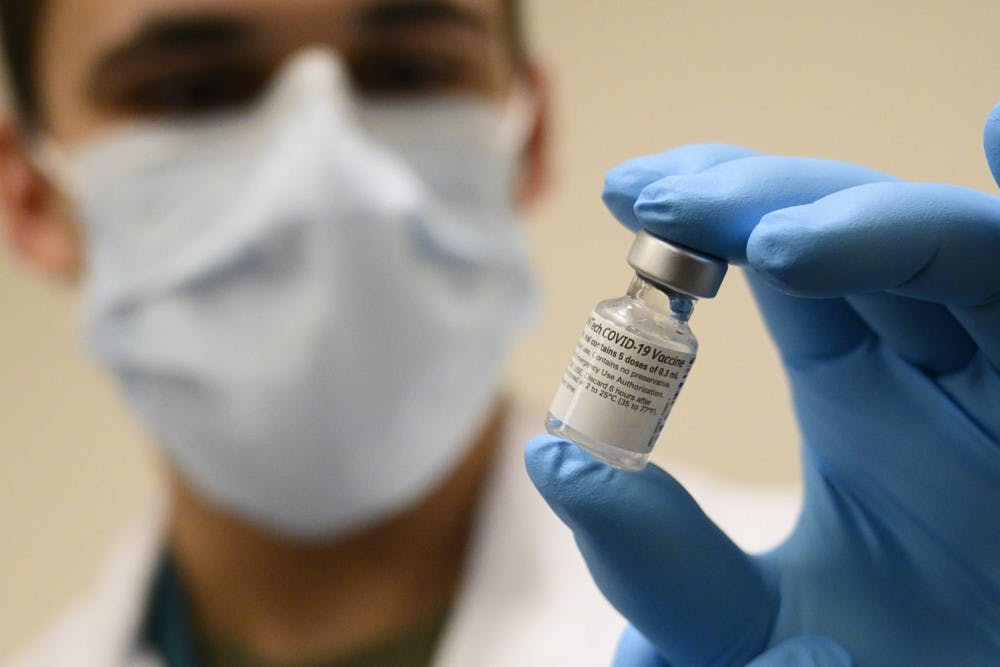Providence has expanded vaccine eligibility to all residents ages 18 or older in “some of the neighborhoods hardest-hit by COVID-19,” Providence City Hall announced March 22.
Pawtucket also expanded its vaccine eligibility to all adult residents of the city, according to a March 22 announcement from Pawtucket City Hall.
“We are continuing to work with the State through the High Density Community initiatives in order to continuously get vaccines in the arms of Pawtucket residents,” Donald R. Grebien, mayor of Pawtucket, said in the press release.
With the expansion of eligibility this week, adult residents in Pawtucket and in the Providence zip codes of 02904, 02905, 02907, 02908 and 02909 are now eligible to receive vaccines on a first-come-first-serve basis at clinics managed by the Providence Emergency Management Agency and other community partners. All three currently available vaccines — made by Johnson and Johnson, Pfizer and Moderna — will be used.
“In the seven hardest-hit zip codes throughout the state, the COVID-19 hospitalization rate for people as young as 25 is higher than the hospitalization rate in the rest of Rhode Island for people over 60 years old,” Jorge Elorza, mayor of Providence, said in the press release, emphasizing the importance of focusing distribution efforts “where the risks are most severe.”
For Providence, the decision was made in collaboration between the Rhode Island Department of Health and multiple partners including City Hall, according to Philip Chan, medical director at RIDOH and associate professor of medicine and behavioral and social sciences at the University.
“In addition to our age-based factoring … we have also prioritized geography, and what we’ve learned during the pandemic, of course, is that some areas are harder-hit than others,” Chan told The Herald.
Chan emphasized that the city determined which neighborhoods are at risk using data-driven research, and that selected neighborhoods with expanded eligibility have “had a really high burden of COVID cases throughout the pandemic.”
Individuals in these zip codes “were hospitalized at much higher rates and at much younger ages,” Ben Smith, director of communications and media relations for the City of Providence, wrote in an email to The Herald.
Currently, all residents of Rhode Island over 60 years of age are eligible for vaccination, largely due to the high rates of COVID-related hospitalization within these populations.
Per 100,000 people ages 60 to 69 in Rhode Island outside of the high density communities there have been 657 hospitalizations, according to Smith.
But in the regions designated as “hardest-hit,” there were 2,679 such hospitalizations — more than quadruple the rate outside of these areas.
Likewise, in the designated zip codes, for residents ages 19 to 24 there were 583 hospitalizations per 100,000 people, and for residents ages 25 to 29 there were 702, Smith wrote.
Racial disparities also played into the designation of the “hardest-hit” zip codes, as Black and Latinx communities have been the hardest hit by the COVID-19 pandemic.
While predominantly Black and Latinx communities in Providence are generally more densely populated, “they have (a) lack of access to health care in general” due to “long-standing infrastructure (and) structural barriers,” Chan said.
“All of that leads to increased cases of COVID and makes these communities disproportionately impacted,” he added. “That’s what we’re trying to address in terms of making sure that we have (an) equitable distribution of these vaccines.”
Part of outreach to these vulnerable communities has involved breaking down structural barriers, including working to improve transportation to the clinics and increasing overall accessibility, Chan said. “We try to make sure to have culturally competent staff” that “speak multiple languages,” he added.
Providence organizations have also done outreach to minimize reluctance toward vaccination within the city, The Herald previously reported.
The recent expansion of vaccine eligibility is part of an ongoing initiative from the cities to widen vaccine eligibility in “high density communities.” The March 22 decision was an increase in the number of participating neighborhoods following an earlier March 2 announcement that all residents ages 50 or older in certain “hardest hit” neighborhoods were eligible to receive the vaccine.
James Notzen, a resident of the 02909 zip code, received his first vaccination soon after the March 2 announcement, given that he is over 50 years of age. He noted that the process for signing up was quick and accessible.
“It was really easy,” Notzen said. “I would say within six minutes of finding out I was eligible I signed up for a vaccine.” Notzen was then able to make an appointment that was “pretty immediate, within a couple of days,” he added.
Although Notzen is not a member of the low-income, Black or Latinx communities targeted specifically by the eligibility expansion, he emphasized that he sees the increase in vaccine eligibility as a good way to support other community members.
“You have a lot of multi-family, intergenerational households” and “service workers” in the area, for whom “the risk of transmission is much greater,” he said. For Notzen, this makes it important to prioritize these areas.
In its initial stages of planning for vaccine distribution, Providence sought to “prioritize equity, lowered death rate (and the) economy” with its limited supply, The Herald previously reported.
The city has also prioritized certain occupations in vaccine eligibility, namely health care workers and, more recently, educators.
“We obviously want everyone to get a vaccine,” Chan said. “In the meantime, while we have such limited (supply), we have to prioritize them to communities who are the hardest hit.”

Jack Walker served as senior editor of multimedia, social media and post- magazine for The Herald’s 132nd Editorial Board. Jack is an archaeology and literary arts concentrator from Thurmont, Maryland who previously covered the Grad School and staff and student labor beats.





